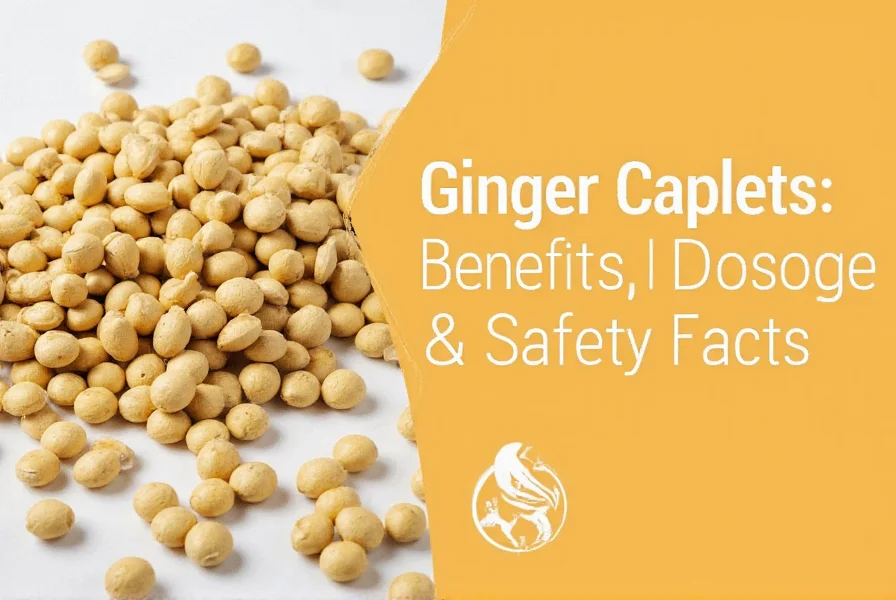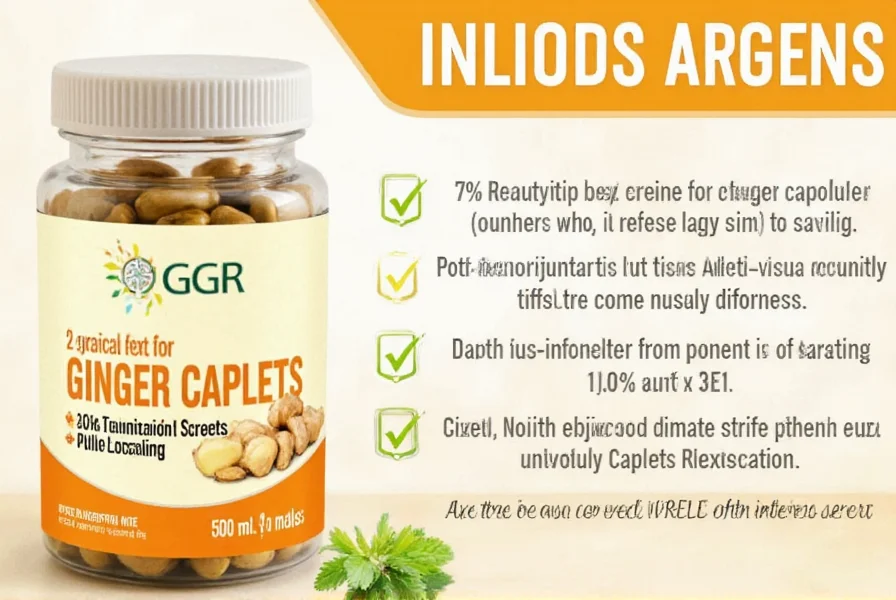Ginger caplets deliver the therapeutic properties of ginger in a standardized, easy-to-consume format. Unlike fresh ginger root which varies in potency, quality ginger caplets contain consistent amounts of bioactive compounds per dose, making them valuable for targeted health support. Research indicates ginger supplementation can reduce nausea severity by 31-60% in various clinical settings according to a Journal of the American Medical Association meta-analysis.
What Exactly Are Ginger Caplets?
Ginger caplets represent a modern evolution of traditional ginger consumption. These compressed tablets contain ginger extract standardized to specific concentrations of gingerols and shogaols—the primary bioactive compounds responsible for ginger's therapeutic effects. Manufacturers typically use either:
- Ginger root powder (dried and milled)
- Standardized ginger extract (concentrated to ensure consistent potency)
- Enteric-coated formulations (for digestive tract delivery)
The caplet format eliminates the strong flavor and fibrous texture of fresh ginger while providing precise dosing. Each serving typically delivers 250-1000mg of ginger compounds, allowing users to achieve therapeutic doses without consuming large quantities of raw ginger.
| Ginger Supplement Form | Standardized Dose | Convenience | Shelf Life |
|---|---|---|---|
| Ginger caplets | ✓ Consistent potency | ✓ Easy portability | ✓ 2-3 years |
| Fresh ginger root | ✗ Variable potency | ✗ Requires preparation | ✗ 2-3 weeks refrigerated |
| Ginger tea | ✗ Inconsistent extraction | ✓ Simple preparation | ✗ 6-12 months |
| Ginger powder | ✗ Moderate consistency | ✓ Versatile use | ✓ 1-2 years |
Science-Backed Benefits of Ginger Caplets
Clinical research supports several evidence-based applications for ginger caplets:
Nausea and Motion Sickness Relief
A 2022 systematic review in Integrative Medicine Insights concluded that 250-1000mg of ginger daily significantly reduces nausea severity across multiple contexts. This includes:
- Morning sickness during pregnancy (after first trimester)
- Post-operative nausea
- Chemotherapy-induced nausea
- Travel-related motion sickness
Ginger caplets for morning sickness provide a non-pharmaceutical option with fewer side effects than conventional antiemetics.
Digestive Health Support
Ginger stimulates gastric motility and digestive enzyme production. A double-blind study published in European Review for Medical and Pharmacological Sciences found that 1.2g of ginger daily accelerated gastric emptying by 25% in participants with functional dyspepsia. Ginger caplets for digestion work by modulating gastrointestinal contractions without causing dependency.
Inflammation Management
The anti-inflammatory properties of ginger caplets stem from their ability to inhibit COX-2 and 5-LOX enzymes—similar to NSAIDs but without the gastrointestinal side effects. Research in Arthritis demonstrated that 500-1000mg of ginger extract daily reduced osteoarthritis pain by 30% after 12 weeks of consistent use.
Optimal Dosage Guidelines
Determining the best ginger caplets dosage requires consideration of your specific health goals:
- Nausea relief: 250-500mg taken 30-60 minutes before potential nausea triggers
- Digestive support: 500mg taken 15-30 minutes before meals
- Inflammation management: 1000mg divided into two daily doses
Most clinical studies showing significant effects used doses between 500-2000mg daily, typically divided into multiple servings. For ginger caplets effectiveness, consistency matters more than single high doses—daily use for 4-8 weeks yields optimal results for chronic conditions.
Safety Profile and Potential Interactions
Ginger caplets are generally well-tolerated, but understanding potential side effects ensures safe usage:
- Mild gastrointestinal effects: Heartburn or mouth irritation in sensitive individuals
- Blood thinning: Ginger may enhance anticoagulant effects—consult your physician if taking blood thinners
- Blood sugar impact: May lower blood glucose levels—monitor if diabetic
- Pregnancy considerations: Generally safe after first trimester but consult your obstetrician
People with gallstone conditions should exercise caution as ginger may increase bile production. Those scheduled for surgery should discontinue ginger caplets at least one week pre-operation due to potential bleeding risks.
Selecting Quality Ginger Caplets
Not all ginger supplements deliver equal benefits. When choosing ginger caplets for maximum effectiveness:
- Look for standardized extracts specifying gingerol content (minimum 5%)
- Verify third-party testing seals from USP, NSF, or ConsumerLab
- Check for additional ingredients that might cause sensitivities
- Prefer products disclosing ginger source and extraction method
- Consider enteric-coated options for digestive conditions
Ginger caplets vs fresh ginger involves trade-offs: while fresh ginger contains additional compounds, caplets provide consistent dosing and convenience. For therapeutic applications requiring precise amounts, standardized caplets often prove more effective than variable fresh preparations.

Integrating Ginger Caplets Into Your Wellness Routine
For optimal results with ginger caplets:
- Take with food to minimize potential stomach irritation
- Pair with black pepper to enhance absorption of active compounds
- Track your symptoms to determine personal effectiveness
- Combine with other evidence-based approaches for comprehensive support
- Allow 4-6 weeks for chronic conditions to show improvement
Remember that ginger caplets work best as part of a holistic approach to wellness rather than a standalone solution. They complement dietary and lifestyle modifications for nausea management, digestive health, and inflammation control.
Conclusion
Ginger caplets provide a scientifically supported option for harnessing ginger's therapeutic benefits in a convenient, standardized format. When selected carefully and used appropriately, they offer significant advantages for nausea relief, digestive support, and inflammation management. As with any supplement, consult your healthcare provider before starting ginger caplets, especially if managing chronic health conditions or taking medications.
Frequently Asked Questions
How quickly do ginger caplets work for nausea?
Most people experience nausea relief within 30-60 minutes after taking ginger caplets. Clinical studies show significant reduction in nausea severity within one hour, with maximum effects occurring around 2-3 hours post-consumption. For motion sickness prevention, take ginger caplets 30-60 minutes before travel.
Can I take ginger caplets every day?
Yes, ginger caplets are generally safe for daily use at recommended doses (up to 2000mg daily). Long-term studies show good tolerance with consistent daily use. However, if you experience heartburn or mouth irritation, consider taking periodic breaks or reducing your dose. Consult your healthcare provider for personalized advice if using daily for more than 3 months.
Do ginger caplets interact with medications?
Ginger caplets may interact with blood thinners (like warfarin), diabetes medications, and blood pressure drugs. The compounds in ginger can enhance the effects of these medications, potentially causing excessive bleeding, low blood sugar, or low blood pressure. Always consult your physician before combining ginger caplets with prescription medications, especially if you take anticoagulants or manage chronic health conditions.
What's the difference between ginger caplets and ginger pills?
Ginger caplets and ginger pills refer to the same type of supplement—compressed tablets containing ginger extract. The terms are often used interchangeably, though 'caplets' typically describes oval-shaped tablets while 'pills' may refer to round tablets. Both deliver standardized ginger doses; the difference is primarily in shape and manufacturer terminology rather than composition or effectiveness.
Are ginger caplets safe during pregnancy?
Ginger caplets are generally considered safe for nausea relief after the first trimester of pregnancy. Multiple studies, including research published in the journal Obstetrics & Gynecology, show ginger's effectiveness for morning sickness with no adverse effects at doses up to 1000mg daily. However, pregnant women should consult their obstetrician before starting ginger caplets, especially if they have a history of miscarriage or other pregnancy complications.











 浙公网安备
33010002000092号
浙公网安备
33010002000092号 浙B2-20120091-4
浙B2-20120091-4